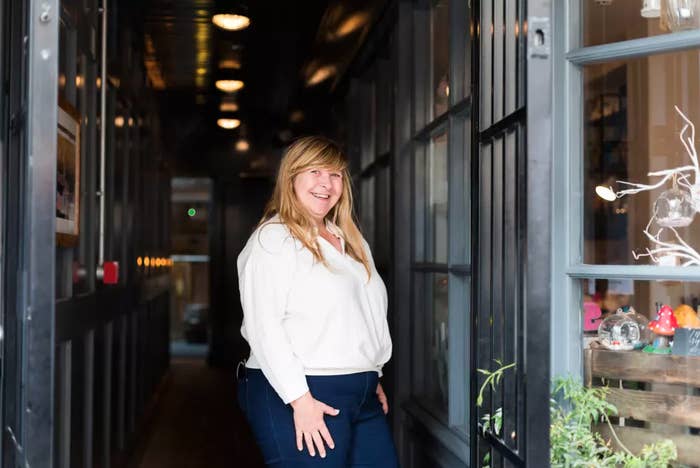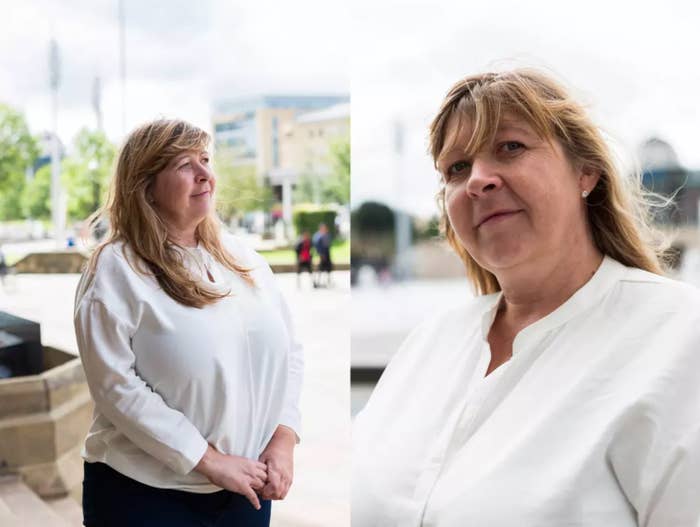
A group of women who were sexually exploited as teenagers have won a landmark legal battle to have their criminal convictions wiped from their records.
Fiona Broadfoot was one of three women who brought the groundbreaking case to the High Court, arguing that convictions for prostitution as a result of being groomed into the sex trade have had a far-reaching impact on their lives.
They successfully argued that the disclosure of their convictions for soliciting was disproportionate and a breach of their right to respect for private life.
The ruling will have huge implications for not only them, but other women who were groomed into the sex trade.
Broadfoot first told her story to BuzzFeed News back in August last year, explaining how she had been forced into prostitution, and why she had taken her fight to the High Court.
“I met a pimp aged 15, and two weeks later I was thrown into the violent and abusive world of prostitution,” Broadfoot, 48, from Bradford, West Yorkshire, told BuzzFeed News. “Rape became an occupational hazard but I was arrested, charged, and criminalised for loitering for the purposes of being a common prostitute.
“After more than 20 years out of prostitution, I am still having to explain my criminal record to any prospective employer. It feels like explaining my history of abuse.”
She told BuzzFeed News that she sobbed when she heard that her legal challenge had been successful after the judge's decision was handed down today.
“Finally, I feel like a weight has been lifted off my shoulders – it’s a vindication,” she said. “I have carried these convictions around – eight pages of them – all my life and it’s a disgrace. Not one of those men who bought and used and abused me – even the ones who knew fine well I was a child when first put on the streets – has ever had to face the consequences of his actions. It has been a long fight but worth it.”
She added: “I'm absolutely delighted about the decision. A huge weight has been lifted from my shoulders. I can now live my life with dignity and not in the shadow and stigma of abuse.”
Broadfoot said she was also pleased to have won the case “for the hundreds of other women who have been convicted” under similar circumstances.
“It's about time that the powers that be take a look at the legislation surrounding the sex trade,” she said, “and put the criminal focus right where it belongs: on the sex buyers and pimps and traffickers.”

The evidence presented by the women showed that the disclosure of their records was deeply stigmatising, impacted their ability to exit prostitution, and had adversely affected employment, volunteering, education and training opportunities.
In August, Broadfoot told BuzzFeed News: “I couldn't get on a university degree, a social work degree, I couldn't get into child development at college. They said I could get on to the course but I wouldn't be able to find a placement because of my criminal record.
“I've been discriminated against in my workplace – I wouldn't even apply for some jobs. I wanted to be on the PTA at my son's school and I had to tell the headteacher. It was really embarrassing.”
Each time she has to disclose her criminal record it's “humiliating”, she said. “I feel so exposed. They say it's about safeguarding – safeguarding who? After all the hell I've been through.
“When I was pregnant with my beautiful son I was watching over my shoulder. I was petrified they'd take him off me. I've had ‘prostitute’ daubed on my house. It's horrible being treated like that.
“What that does to me is make me feel like I deserved that abuse – it messes with your head in terms of your recovery.”
In his judgment, Lord Justice Holroyde said: “The witness statements of the claimants paint a grim picture of the circumstances in which they committed their soliciting offences, of their vulnerability when first required or persuaded by 'boyfriends' to prostitute themselves, and of the violence and abuse to which they were subjected at the hands of the men who groomed, trafficked, and prostituted them.
“Having read their evidence, and the evidence of other witnesses who have similar forlorn histories to relate, I have no difficulty in accepting that all three claimants have, even as adults, been victims in many other ways.”
Harriet Wistrich, who represented the women in court, said: “This is an important judgment – although there were only three claimants in this case, the judgment will benefit all women in these circumstances and has the potential to bring about real change for sex trade survivors who should never have been criminalised in the first place.”
The court, however, did not accept that the disclosure and barring service (DBS) scheme discriminated against women and was contrary to the UK’s legal obligations in respect of the trafficking of women, a decision that Wistrich said they planned to appeal against.
“Unfortunately, the court were not persuaded by our argument that the practice discriminates against women or is in breach of duties with regard to trafficked women,” she said. “We will be seeking permission to appeal in relation to those broader points. It is not easy for women with a history of prostitution to come forward and advocate for themselves and others – so much stigma attends them – so the courage and determination of these women is to be applauded.”
The DBS scheme requires mandatory disclosure of “spent” criminal convictions when applying for certain jobs or volunteer activity in some areas, primarily involving contact with vulnerable people.
The decision should result in the women being able to have their DBS records filtered to remove the soliciting offences – though the mechanism for this is not yet clear.
Karen Ingala Smith, the CEO of Nia, a women’s charity supporting survivors, who also supported the women in court, said: “We feel strongly that these women should never have been convicted in the first place. Prostitution is symptomatic of women’s continued inequality and discrimination and a form of violence against women.
“These women were exploited and coerced and yet it is their lives, not those of their buyers and pimps, that were blighted with convictions. They should not have had to take up this fight, but they did and it is to the benefit of all those exploited in prostitution.”
